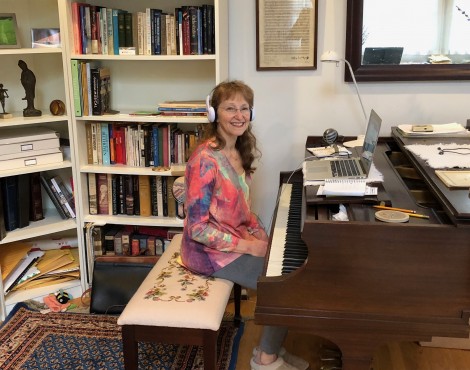“When I first heard about the university transitioning to online lessons, my first thought was that this would be the end of music making for me at Princeton,” said Yang Song, a senior clarinetist in the Program in Music Performance. Figuring out how to translate the Department of Music’s robust performance curriculum into an online platform has certainly been a challenge, especially for the 358 students and 45 performance faculty members who are participating in private vocal and instrumental lessons this semester. Scheduled weekly throughout most of the semester, these lessons are at the heart of the Department’s performance program both for concentrators and certificate students, and also provide opportunities for others to pursue their instrument co-curricularly. Given the intimate nature of individual instruction and the deeply personal nature of performance, they often provide a crucial and unparalleled role in the lives of students and instructors alike. “The lessons are an important personal, one-on-one check in with students, and a welcome distraction from the stresses of their school work and the stresses of the world,” explains voice faculty member Martha Elliott. While about 10% of students taking lessons are not able to continue with their instruction remotely due to lack of instrument access or logistical and technological constraints, for the remainder, the ability to continue lessons has proven to be a welcome and inspiring respite.
For first-year student Brendan Zelikman, “continuing my piano lessons online has quite literally kept me sane, giving me something to look forward to. As all my goals and plans for the next six months fell apart, my piano was there as it had always been, waiting to be played. And my teacher [Margaret Kampmeier] was right there with me, continuing to be compassionate and supportive. If anything, this transition has brought us closer. Through our weekly lessons, I found genuine motivation again.”
Piano faculty member Francine Kay expressed a similar sentiment: “It has seemed particularly poignant that in the midst of this pandemic, we can lose ourselves and connect so directly through a screen, in the pursuit of expressing the profound humanity of music.”
Driven by this common goal, students and faculty have implemented creative solutions to create the best possible remote lesson experience through Zoom, FaceTime, or Skype. One of the greatest challenges is the poor sound quality of live transmission, especially given the unpredictability of internet connections — an aspect crucial to the nuance of performance instruction. To circumvent this, Dr. Kay’s students upload audio recordings of selections from their repertoire for review prior to their virtual lessons. This recorded reference allows for a much more detailed exploration of the music during the online meetings. Self-recording also encourages students to hear themselves in a new way. “While we knew before this transition that recording oneself is hugely beneficial, it took the necessity of coming up with a new way to instruct to motivate us to take this extra, work-intensive step consistently.”
Trineice Robinson-Martin, specializing in jazz vocal instruction, has also found that the online format encourages students to find more confidence in their music-making. “The virtual platform makes the students much more independent, as they are forced to self-assess and be more articulate about the process and how they experience the subtleties of vocal function.” Some students are learning to accompany themselves while singing; others have taken advantage of accompaniment apps like Appcompanist, or accompaniment tracks on YouTube and other streaming services. The most efficient set-up is as individual a preference as the distinct relationship between instructor and student.
Then there are cases of instruments, such as the harpsichord and organ, whose limited availability of access poses even greater challenges. How can students who can no longer play their instruments continue to remain engaged? This seemingly impossible task has fostered some ingenious solutions. Wendy Young, Director of Early Music Princeton and harpsichord instructor, is organizing a workshop with a respected harpsichord builder to teach students about the history and construction of their instruments. She is also collaborating with university organist Eric Plutz to highlight for students the often overlooked relationship and overlap between the two instruments. “I am excited about these two initiatives,” she writes, “and think it will be something that will continue beyond the pandemic. This, perhaps, is a silver lining.”
This expanded notion of what a private lesson entails has been explored across all instruments. Jo-Ann Sternberg, on the clarinet faculty, organized a master class for all twelve of her students with the principal clarinetist of the Metropolitan Opera Orchestra, Anton Rist. For Yang Song this was a dream come true: “I could have never imagined anything like this, and the fact we could coordinate this with everyone in different locations was phenomenal, and something which would be hard to do even in person…I was absolutely shocked by how many new and creative opportunities have emerged as a result of this unique situation, and despite thinking that I would never do a virtual lesson, I look forward to them every time. It is one of the things that brings me joy during this crisis.”

